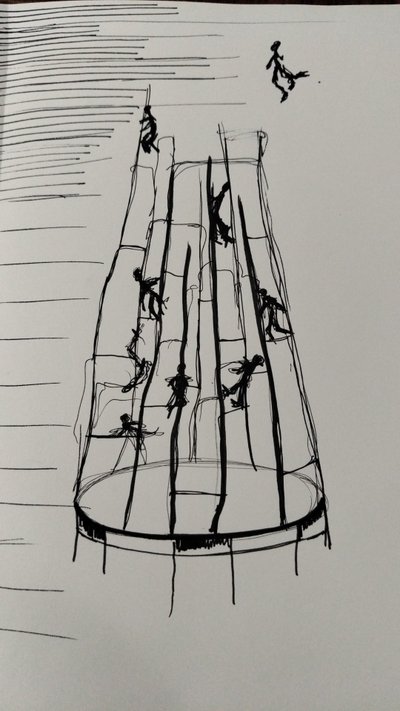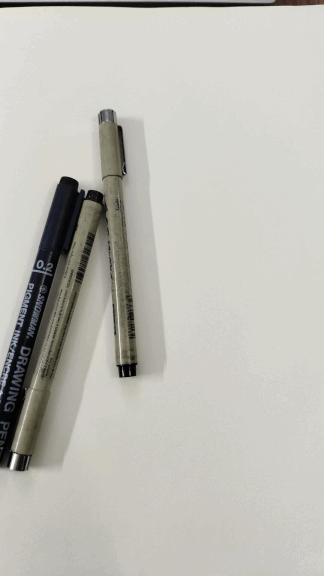'The Butterfly Effect' Artwork!

For Better Image Quality Click HERE
Artist Process:

For Better Gif (Artist Process) Quality Click HERE
A Hidden Fight in Every Action
My artwork today, Butterfly Effect, might look simple at first glance. But it carries a deep philosophical idea: even though humans live together and often want the best for each other, nature wires us into constant, subtle competition. Every action, no matter how small, sparks a competitive ripple effect. In Butterfly Effect, you might see people clashing, like riders in a death-defying stunt ring. It’s chaotic, intense, and deliberate.
Good Intentions, Unintended Fights
Do we always want the best for each other? Or do our actions, even unintentionally, harm others? I call this unintentional harm a "fight." Take my artwork. Butterfly Effect could stand alone as good or bad, depending on how you see it. But when you compare it to another artist’s work, its value shifts. That comparison, where my art’s worth depends on someone else’s creation, creates a fight. Another artist makes their work without thinking of me, yet their creation challenges mine. It’s like they’ve stepped into a ring with me, not out of malice, but because their art exists. We call this "healthy competition," and it can inspire me to improve. But the question remains: does Butterfly Effect trigger a fight, and are we, despite wanting the best for each other, unintentionally causing harm?
The Hive Reward Pool: A Subtle Battle
Take the Hive platform as an example. We all post content, hoping for rewards from a shared reward pool. When someone else posts, we don’t think, “Their post will cut my rewards.” But because the reward pool is a shared resource, their post reduces what I might earn. Every upvote we give to one creator pulls from that same pool, shrinking someone else’s share. People complain when someone downvotes them for rewards adjustment, saying it hurts their rewards. But have we considered that upvoting someone else does the same? A simple upvote, meant to support, creates a fight by redistributing a shared resource. This is the butterfly effect in action: a small act ripples into a competitive outcome.
A Glance That Sparks Conflict
Here’s another example. Imagine you’re walking with your partner and notice someone strikingly beautiful. You don’t mean to stare, but you do. Your partner notices and gets upset, sparking an argument. The person you saw didn’t intend to cause trouble; they were just living their life. Yet their presence triggered a fight between you and your partner. It’s human nature, but it shows how small moments can create conflict.
Nieces and the Competition for Love
I have two nieces: Hajra, three, and Mahnoor, five. My father adores Hajra because she’s obedient and affectionate. Mahnoor, though, is independent, doing what she wants. I love Mahnoor’s spirit; she takes risks and follows her heart, which I think is vital in life. But my father prefers Hajra’s compliance. If only one niece existed, she’d get all our love. Because there are two, their personalities compete for our affection, creating a subtle fight. Neither girl intends this; their mere existence sparks it. This is the butterfly effect: small differences in who they are shape how we share our love.
Trading and the Ripple of Sales
Another example: in the Hive community, when we buy or sell, we don’t think about how our trades affect others. But every sale impacts the market price, even slightly. If I sell, the price might dip, affecting someone else’s earnings. In a connected community where we want to help each other, a single sale can trigger a chain reaction, creating a fight we didn’t intend. It’s not malicious; it’s just how the system works.
Are We Always Fighting?
So, what does this mean? Humanity strives to live socially, to lift each other up. But the butterfly effect turns even our good intentions into fights. My artwork, Butterfly Effect, captures this natural human phenomenon: a constant, often unintentional battle driven by how the world is designed. What do you think? Do you agree that humans are always caught in this subtle fight, whether we mean to be or not? Share your thoughts in the comments, and let me know if you see this constant battle in the design of our world.

Well, the topic is pretty deep and the examples you casted have a multitude of explanation in their own realms. I don't think it is possible for me to cast my view on all the perspectives in this comment.
Yes, everything happening in this world is wired with every other thing. Our actions DO make an impact on other people and objects in a certain way. Nevertheless, what impact our actions will have is not predictable by the actions alone. The traits of the recipient of that action have a great influences on what it makes out of that intake. For instance, the water is same for all but the seed decides if the plant will turn into an apple tree or a cactus.
So far as the example of love for the nieces is concerned..... yes, it happens that we unintentionally start showing appreciation for one more than the other because of their own traits and then the actions create ripple effect. Nevertheless, the situation does not ONLY boils down to the fight or competition between the two. For instance, if you only had Mahnoor (and not any other competitor) with the same kind of rebellion and independent personality she has, would you father be appreciative of her the same way he is of your other niece today?
This is a million-dollar question! As far as I can recall, yes. Before Hajra, he loved Mahnoor a lot because she was his first and only grandchild. So, I believe competition and comparison can change how people see the world and the decisions they make. The same applies to love life. Your husband might find you beautiful, but if he keeps comparing you to someone else, his perspective about you will change.
Let's see it from a different angle @dlmmqb . Before Hajra, Mahnoor was only 2 years old. By that time, her independent personality was not that evident as it is now. So, if she grew up into a personality she is now without Hajra being available for the competition, would your father be appreciative of her or would dislike her behavior.
I won't say he doesn't love her today. It's just he doesn't appreciate her noncompliance.
Here my question is a bit different. Are there no competitors available for me in this regard? There certainly are. Many pretty ladies are all around but my marital life or my husband's love for me are not affected by them. It means the MERE EXISTENCE of competitors or competitions is not an issue. Everything boils down to how we perceive those stimuli and then how we react.
View more
Thanks for engaging with my content! I've sent you an extra gift of 1 @drawmatic
Two days ago, I was talking with my son about this very topic: the butterfly effect, and how a simple action, no matter how small, can change so many things. It was a profound conversation.
Greetings friend
Thanks for sharing your family moment with me. In that case, we should tag your son to read this too. @suisver
https://www.reddit.com/r/artwork/comments/1mh4ejw/the_butterfly_effect_artwork/
This post has been shared on Reddit by @dlmmqb through the HivePosh initiative.
This post has been manually curated by @steemflow from Indiaunited community. Join us on our Discord Server.
Do you know that you can earn a passive income by delegating to @indiaunited. We share more than 100 % of the curation rewards with the delegators in the form of IUC tokens. HP delegators and IUC token holders also get upto 20% additional vote weight.
Here are some handy links for delegations: 100HP, 250HP, 500HP, 1000HP.
100% of the rewards from this comment goes to the curator for their manual curation efforts. Please encourage the curator @steemflow by upvoting this comment and support the community by voting the posts made by @indiaunited..
This post received an extra 15.85% vote for delegating HP / holding IUC tokens.
Congratulations @dlmmqb! You received a personal badge!
You can view your badges on your board and compare yourself to others in the Ranking
Check out our last posts:
That is a question we need to ponder over critically. The butterfly carries great message of freedom. Great work
!INDEED
!ALIVE
Thanks!
It's always amazes me how you can read 11 posts in 1 hours. I wish I was a super human like you.
Waoh, I am sort of words, thanks boss.
!ALIVE
View more
Greetings, friend. I love physics, but I'm not very good at drawing.
Happy birthday. We already know your age. We don't get along very well. I'm 18. I hope you're doing well. A big hug from afar.
Like your mom said, you had a discussion related to outcomes of actions. It's more about butterfly effect and less about art. Most of my artwork is made with a purpose in mind to either talk about my life or raise awareness.